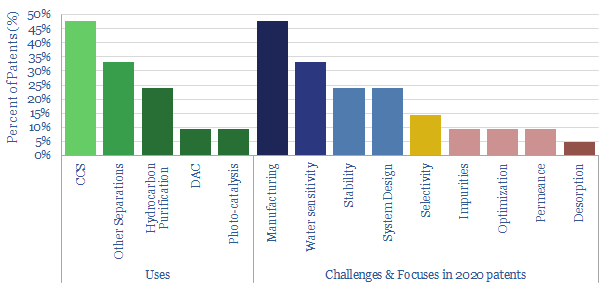This data-file reviews twenty patents from 2020 into metal organic frameworks, an exciting class of materials which could reduce the energy penalties of CO2-separation by c80% and reduce the ultimate cost from $50-150/ton to $15-40/ton.
Sorbents are classes of materials that are useful for separating industrial mixtuers, as they adsorb some compounds but not others. They can be disposed on specialized membranes, or in tanks, where compounds can be adsorbed and later desorbed by pressure swings.
Metal organic frameworks could be be particularly useful for CCS or DAC. Today’s CCS and DAC processes are only 5-10% efficient, compared to their therodynamic minimum energy, and we increasingly wonder whether AI engines can help to develop sorbents with materially better performance.
The state space of metal organic frameworks is very large. MOFs were first described 20-years ago by US chemist Omar Yaghi. In 2017, over 6,000 new MOFs were published. Over 40,000 MOFs had been identified mid-2018. Over 90,000 have been identified by 2021.
Metal organic frameworks can also be higly porous. Some fit the entire surface of a football field into a teaspoon of powder weighing less than 1 gram, e.g., 10,000 m2/g, which is c1,000x a typical zeolite.
The challenge is finding MOFs that are stable and water-resistant, then synthesizing them in continuous, mass-scale processes that do not require expensive solvents.
Costs of metal organic frameworks remain unclear. One paper suggests baseline costs of $35-70/kg. This is 1-2 orders of magnitude more expensive than today’s commercial zeolites, such as 13X, which typically range from $1.5-3/kg (tabulated here).
Reasons for high metal organic framework costs include the susceptibility to passivation by water, and the tendency for contaminants to form when deprotonating the solvents from which MOFs are synthesized.
ExxonMobil has made the visible recent progress. The data-file also captures smaller-stage companies with interesting patents in 2020. More recently, we have also screend exciting progress from Montana Technologies, using metal organic frameworks to lower the energy costs of air conditioning units by 50-75%.
Also included in this data-file are our notes from technical papers and a simple economic model. We are due an update of this data-file, which is on our to do list.

